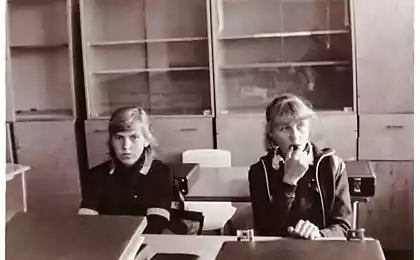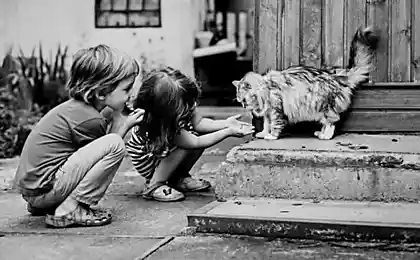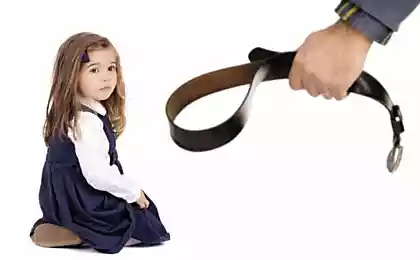533
Again about the harmful help

Helping others is a good thing and needed. Hardly anyone would argue with the obvious. But sometimes can cause enormous harm to those whom it was aimed. Often from improper care suffer, without being aware of it, children living in orphanages.
For example, a large foster mother Natalia Karaeva (of seven children), complains that her oldest son just did a gambling problem. Boy, when he was in the orphanage, asked for money, and good sponsors are happy to translate on the phone, online wallet, I guess, glad to help "the orphan".
The teenager with the money betting into the tote. And after he was in foster care, has ceased to receive such "gifts" and began to steal. Somehow the adults never even occurred to me to think — and whether to give money so, at the first request, whether the person is able to dispose of them?
"The word "sponsor" is today often associated with one meaning, thoughtless, ignorant use of funds, resources, where we need to do things differently, be treated differently, — said Alexander Gezalov, social activist, international expert on social orphanhood CIS. — People without understanding make unwise investment. Smart investment is when the actions of the sponsor or the situation has radically improved, or there are visible signs of this.
Often a sponsor is the person emotional message, which does not include a deep analysis of the fact that after his "help" may be followed.
Today sponsorship in Russia, more speed: the stir the man, quickly allocated money, not thinking about the consequences.
You can't give money just because they ask. First you need to explore, to understand, to probe, and what do people need? To not give the fish as bait, must invest in the knowledge of the child, in his new life's sensations, which then will help him to socialize in the adult world, when he grows up. And not to bring "in his heart" garment bag. The clothes he could not help in the future, and knowledge — will help, the more knowledge, the more increases the resilience of the man. In people who have received knowledge, skills, and then to invest is not necessary that he would start to do it. And "gifts" turn him into a bottomless, always needs the help of social barrel, a permanent asylum".
A child living in the family understands that the gifts, some travel, cost parents money. How to earn money, he also sees parents go to work tired, tell us about what they do, and often take their children to see what they're doing while they're not home. It's like with food — home child know that food does not appear by itself, first you need to buy groceries (with the money), then to cook... But what to homemade child — the prose of life, raised in an orphanage often Terra Incognita.
Children brought up in orphanages get used to gifts (sometimes expensive — not every family can afford to give, for example, nine year old Chad a brand new iPhone) fall out of nowhere. And then, in adult life presents no one to ensure is not going to...
"In the orphanage, neither the sponsor will not tell you how to live among the people then, when this sponsor will not close. The desire for "the freebie" is read all over: "Oh, I'm supposed to apartment; I wonder how much I got for the book accumulated, — on the iPhone enough?" Thoughts to go out and earn, in the head just don't come. Why? And so will... Tell my children that we no nothing, all by yourself have earned. No need to rely on: only it is necessary to achieve on their own. Years of training change the mind and attitude to life", — says Natalia Gorodiskaâ, head of the project "Café adoptive families" in the city of Penza, a large foster mother (nine children).
Phone — stewat many foster parents I have heard that children can't enjoy the gifts and appreciate them. They teach them all those sponsors.
"When I worked in an orphanage, I remember how I treated children for the arrival of sponsors and their gifts are then sold on the side, was stolen from one another. What they don't appreciate them, may be judged from the fact that if they gave phone brand "weaker" than expected, then, angry, they may hit the wall, so that the phone was being blown to bits," recalls Stanislav Dubinin, the coordinator of the adaptation center of post-residental support on the basis of public organization "House of childhood" in Samara.
"Children in orphanages do not know the price of things because they give clothes, money (even small) — also, plus, come sponsors give gifts, no matter, she was going to school or not, punished or not. He may not learn all rude, send educators three letters, but come the sponsors, and it is beautiful and elegant comes to gifts and participate in events. It creates a pattern that he can do whatever he wants, and for him it will be nothing, and even gifts to give...
I know so many stories about how children are a gift iPhone for 30 000 rubles, and sell for 500 rubles! They just don't know the price of things. They learn it only when you start to go shopping with you and be terrified," continues the conversation Elena Prudnikova, psychologist, Manager of social project "Preparing orphans for life after the orphanage".
It is clear that to buy gifts, just to celebrate — not so hard as to seriously think about what will happen to the children next. Children who are accustomed only to and who later, as adults, will be released in our lives, will live with us. We know that nothing just like that in our world is not given, but they did not. Therefore, will attempt to take. In what ways — do not want to talk.
Home study — the family"Any dances, parties, gifts — all this does not help in adult life the child without the experience of life in the family, says many children and foster mother Olga sinyaeva, the author of the film "Bluff, or happy New year!" about the orphanage system in Russia. — First and foremost, you need to work with blood family, and this is large and material, and professional attachments. If not, to transfer the child to a foster family, and not on an Assembly line".
But my experience says Natalia Gorodiskaâ: "Pro consumer attitude — a sensitive issue for adoptive parents. Even after living years in the family, many adolescents believe that the earth revolves around them. But there are changes, I see them. So the family, its life, needs, business, problems and their solutions, the difficult situation and the ways out of them — best experience of life. The eldest in our family since I was 16. Before five years — in an orphanage. For six months, "killed" two of the tablet. The first is our gift, the second earned myself. The attitude is the same. What a strange confidence that there will be another tablet, new. Now he manages the money, is more frugal. Community College, lives in the Dorm. The house helped, but "can't", "don't know" — a memorized phrase. Never "teach", "show me how"... Now life is made. That does it all. I'm glad I was forced to "learn from me". With the battle, sometimes with scandal and slamming of doors. But the useful life.
Our family is large, and the rules stipulated immediately. I will not promise expensive gifts. But the expectations were. Had to explain that there is a budget. Even with a calculator sat together and considered the costs. Many adoptive parents, in my experience, is in the beginning a serious mistake. They really wanted you to like the adopted child by buying expensive clothes and gadgets. The child naturally believes that it will always be. And then the parents are sincerely outraged: "how could he not understand??!!! He broke the computer and demands a new one!" Not understand and do not understand, if not explain. But can be explained only in the family, in the system to explain it is impossible."
So people who genuinely want to help, you should consider the benefit or harm it will bring help. By the way, you can help families (that was less social orphans), and foster families to the children again returned to the institution. The main thing — to understand how to help. "If a person is not sure that funds can be properly expended, has doubts about how best to help, it is best to find experts who will suggest the right algorithm," — said Alexander Gezalov.
In conclusion, a clear example of the correct help from Alexander Gezalov: "Large family needed a good flute for my daughter. I tried to contact with this request to the sponsors, but they said, "what the flute?! Here are the clothes to take them to the orphanage or candy." The money still managed to find the flute I bought. The girl became a laureate of all-Russian and international competitions. And now she is able to provide for themselves and family to help."published
Author: Oksana Golovko
Source: www.matrony.ru/ne-ryibu-a-udochku-eshhyo-raz-o-vrednoy-pomoshhi/
The difference between men and women in the energy plan
10 inconvenient facts about Your favorite foods























